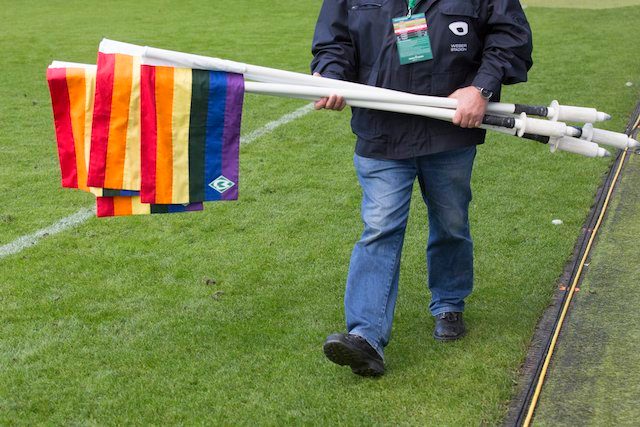SUMMARY
This is AI generated summarization, which may have errors. For context, always refer to the full article.

SYDNEY, Australia – Only 1% of people feel that gays are “completely accepted” on the sporting field, according to a new international survey released on Sunday, May 10, highlighting homophobia.
Close to 9,500 people were interviewed for the survey, initiated by the Sydney organizing committee of a gay rugby event, which found few positive signs that lesbian, gay and bisexual (LGB) people were welcome playing team sports.
“Even in the most promising countries, such as Canada, discrimination and homophobia were still widely experienced by both LGB and straight participants,” it said.
Participants in the study, who mostly came from Australia, Britain, Canada, Ireland, New Zealand and the United States, were also largely unanimous in the view that spectator stands were not accepting of gay people.
About 78% of respondents said they believed LGB people would not be “very safe” if they visibly displayed their sexuality, for example by showing affection to each other.
Participants in the survey also said the most likely environment for sporting homophobia to occur were spectator stands (41%) and school sports classes (21%).
Although not an academic study, the survey, which used data collected by sports market research firm Repucom, was reviewed by seven leading experts on homophobia in sport, including Caroline Symons from Melbourne’s Victoria University.
“Some LGB people can thrive in sport, but many others feel compelled to remain closeted to keep playing the sport they love, monitoring every word they say, to ensure they keep up the appearance of being heterosexual,” she said.
“All this effort to hide their identity can distract from enjoying their sport and improving their performance.”
Fellow Victoria University academic Grant O’Sullivan said casual homophobic language such as jokes heard on the playing fields, or in locker rooms sent a message at odds with inclusiveness.
“Often this language is not meant to be hurtful but can be very damaging when heard by those struggling with their sexuality,” he said.
O’Sullivan said of particular concern was the fact that the negative experience could start in school and had the potential to see gay people avoid sport for the rest of their lives.
Current LA Galaxy and former Leeds footballer Robbie Rogers, one of very few professional footballers to announce they are gay, said he hoped the study would spur change.
“This change can start with every athlete or fan who decides not to use homophobic language even if it’s meant as humor,” he said. – Rappler.com
Add a comment
How does this make you feel?
There are no comments yet. Add your comment to start the conversation.